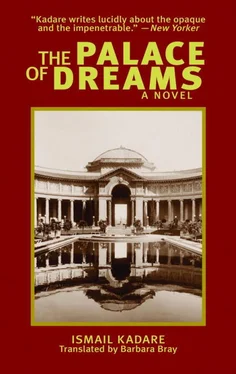When he got up at daybreak he found his mother and Loke just where he’d left them, huddled around the almost dead coals.
“Where are you going, Mark?” said his mother in a terrified voice.
“To the office,” he answered. “Where do you think?”
“Are you out of your mind? On a day like this!”
She and Loke both tried to persuade him not to go that day—just that day—to his wretched work; to say he wasn’t well; to give some more serious reason for his absence; but at all costs to stay away. But he wouldn’t be persuaded. They both implored him again, especially his mother, kissing his hands and bathing them in tears, and saying that on such a day the Tabir Sarrail might not even be open. But the more she begged, the more he insisted on going. Finally he managed to tear himself away and leave the house.
Outside it was more than usually cold. He walked briskly along the street, which as usual at this hour was almost empty. The few passersby, their faces muffled up in shawls, still looked drowsy. His own head was no clearer than theirs. He still hadn’t got over the scene of the night before. Just as certain marine creatures secrete a protective cloud around them, so his brain seemed to have invented a way of avoiding lucid thought. Sometimes he even wondered if anything had really happened at all. It might just have been one of those wild imaginings that filled so many files in the Tabir Sarrail. But the truth finally pierced his brain like a needle, after which his mind fell back into a daze, followed by a lull, which in turn was followed by the shooting pain once more. He’d noticed that in attacks of this kind, the awakening after the first night was particularly disagreeable. He felt as if he were in some fluid intermediate state between sleeping and waking. And his own state seemed to be reflected in the world around him—in the walls of the buildings patched with damp, and the ashen faces of the passersby. These grew more numerous as he approached the middle of the town. He could tell by the way they hurried along—perhaps it had something to do with the fact that they all had the same office hours—which were the ones who worked in ministries and other government offices.
And when he got to the Palace of the Sheikh-ul-Islam he saw there were more soldiers of the Guard on duty than the day before. Their helmets, wet with dew, glinted dully. There were soldiers posted at the crossroads by the bank. Apparently the state of emergency hadn’t been lifted. No, none of this was an illusion. And Kurt was in prison. Perhaps even… The bloodstained carpet that the footmen had rolled up kept enveloping his own thoughts. How would he ever be able to set foot on a carpet again without feeling faint? He felt the desire to vomit rising again….
So the Palace of Dreams is open, he said to himself when he saw the entrances from a distance. The employees were flocking around the doors. Most of them didn’t know one another and didn’t greet, let alone talk to, their colleagues. But in the corridor by the Interpretation Department Mark-Alem did see some familiar faces. And luckily his neighbor was already sitting at his desk.
“So,” he said as soon as Mark-Alem had sat down beside him. “Have you found out anything?”
“No, I don’t know a thing,” lied Mark-Alem. “I’ve only just arrived. What’s happened?”
“I don’t know anything definite myself, but it’s obvious something important has been going on. Did you see the soldiers in the street?”
“Yes—last night and today.”
The other, while pretending to be busy with his file, leaned nearer to Mark-Alem and whispered:
“It seems something has happened to the Quprilis, but no one knows what exactly.”
Mark-Alem felt his heartbeats slacken.
Idiot, he said to himself. You know all about it, so why do you let yourself be affected by what anyone else says? Nevertheless he asked:
“What do you mean?”
His voice had grown faint, as if he feared that to hear what had happened might make it real.
“I don’t know anything definite. It’s only a rumor, perhaps mere gossip.”
“Maybe,” said Mark-Alem, bending over his file and saying to himself, You silly idiot—do you think it’s all going to be sorted out as easily as that?
His eyes were incapable of taking anything in. There in front of him was a senseless dream that he was supposed to explain, while he was ten times more crazy himself. The other clerks were all poring over their files. Every so often you could hear the rustle of pages being turned.
“Even today you can feel a kind of uneasiness everywhere,” muttered his neighbor. “Something’s bound to happen.”
What else can happen? thought Mark-Alem. His head felt as heavy as lead. It seemed to him he might easily fall asleep over his open file and drop a dream on it, like a hen laying an egg. What nonsense, he thought, rubbing his brow. My mind must be wandering. Perhaps after all I’d have done better to stay at home.
Never before had he looked forward so eagerly to the bell for break. His eyes were half closed over the sleep of someone else, as described in the file. Before long his own sleep would merge with the other, as sometimes two human destinies blindly join.
The bell for break startled him. He slowly followed the others down to the basement. The usual hubbub reigned there, as if nothing had happened. Of course, for the others nothing had happened. He tried to catch bits of the conversations going on around him, but none of them had anything to do with what had occurred. Anyway, he thought, what’s the point? No one knew as much as he did about what had taken place. He couldn’t learn anything from their senseless comments.
He had a coffee and started slowly up the stairs again. Beside him the others went on chatting about this and that. Two or three times he thought he caught the word “siege,” and people asking, “Did you see the sentries last night?” But he walked on, asking himself what concern it was of his.
He really thought he didn’t want to find out anything, even out of curiosity. But when he sat down at his desk he realized he was eagerly awaiting his neighbor’s return.
Finally he appeared in the doorway. Mark-Alem could tell by the way he walked that he had news.
“Apparently it’s a dream that’s behind it all,” the other man whispered as soon as he got near enough.
“All what?”
“What do you mean, what? Behind the disgrace that’s fallen upon the Quprilis.”
“Oh! So it’s true?”
“Yes, it’s been confirmed. They’ve been hit very hard. I suspected as much! People had a presentiment here yesterday evening….”
“What sort of dream was it?”
“A strange one, dreamed by a street merchant. You always think that at first—you believe it’s about innocent things like vegetables or grassy plains, and then you find out there’s some great disaster behind it all. It was that kind of dream, with a bridge and a flute, or a violin—some kind of musical instrument, anyway.”
“A bridge and a musical instrument?” gasped Mark-Alem all in one breath. “And then what? What else was there?”
“Some animal going around in circles—but the main thing was the bridge, and the violin.”
Mark-Alem felt as if an elephant were treading on his chest. He’d held the wretched dream in his hands, twice. “What’s the matter? You don’t look well….”
“It’s nothing. I felt rather off-color yesterday evening, and I was vomiting all night.”
“You look like it. But what was I talking about?”
“The dream.”
“Oh yes… So it was the dream that acted as a clue. They deciphered its meaning, and everything was clear. The bridge stood for the Quprilis, you see —Qupri means bridge. And after that the whole thing unraveled of its own accord.”
Читать дальше












